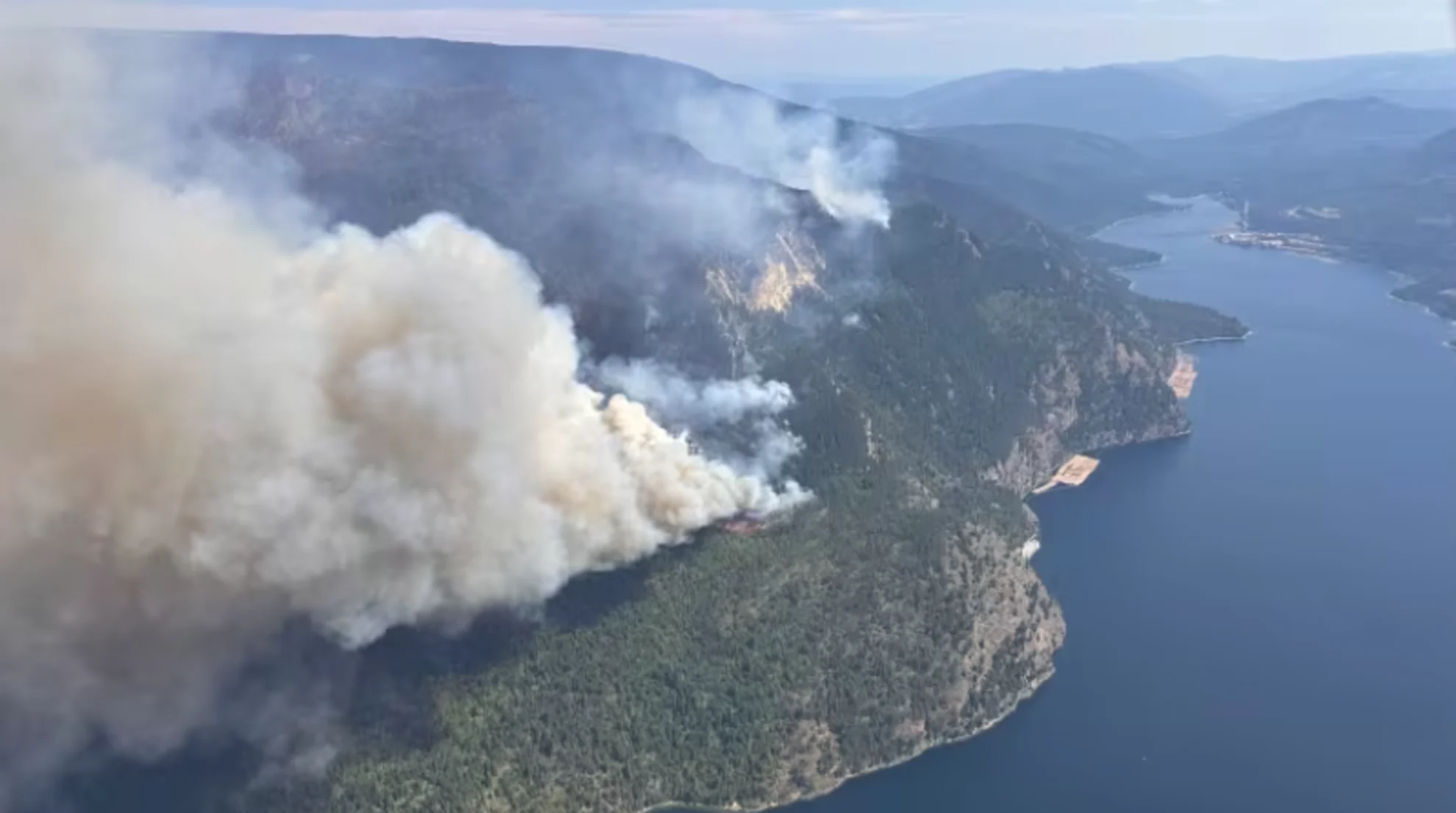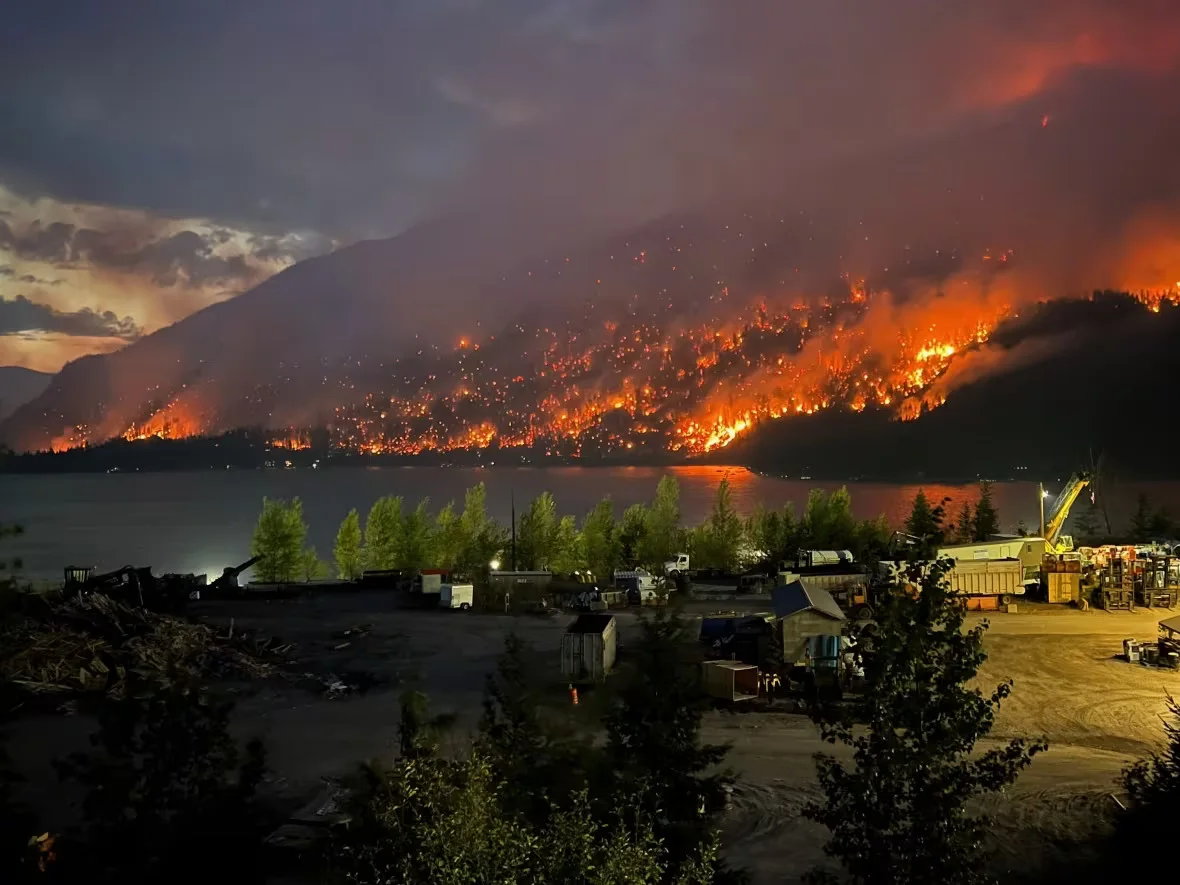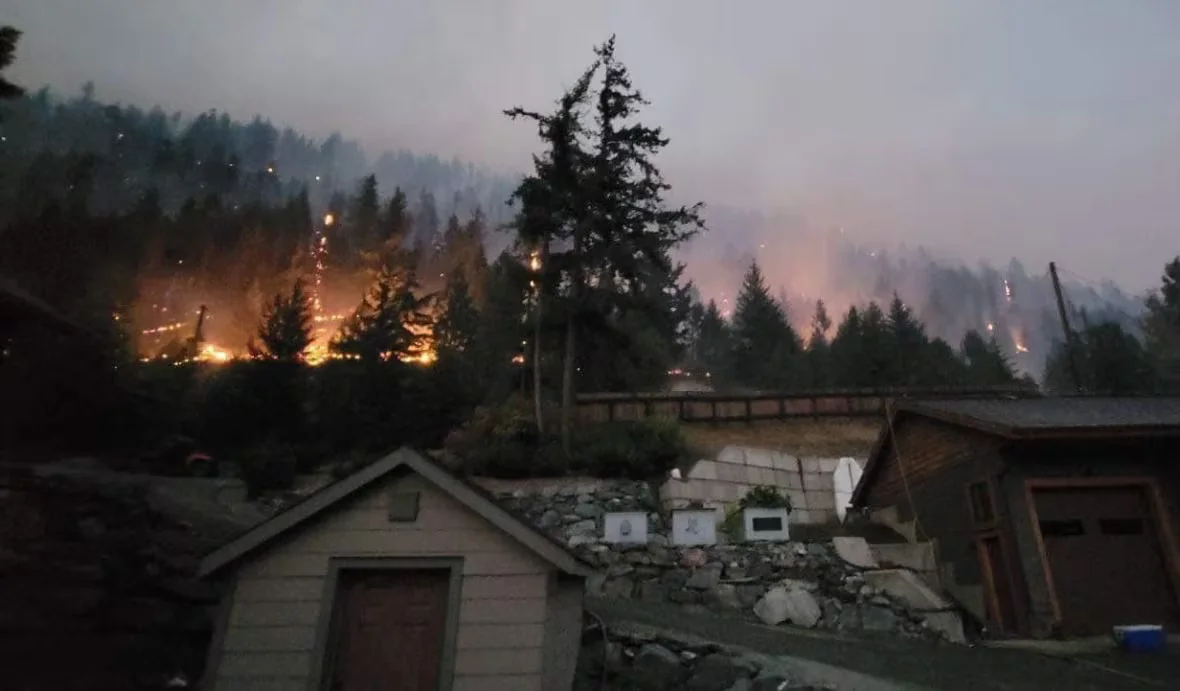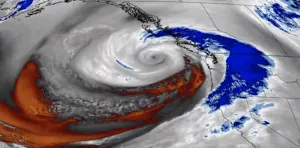
'Worst case scenario' in Adams Lake wildfire prompted evacuations, officials say
Visit The Weather Network's wildfire hub to keep up with the latest on the active wildfire season across Canada.
The British Columbia Wildfire Service says the "worst case scenario" forced residents in the Shuswap region to evacuate their homes on Wednesday as unexpected winds pushed a weeks-old wildfire toward the community of Dorian Bay.
No homes were lost overnight in the Lower East Adams Lake wildfire, B.C. Wildfire Service (BCWS) information officer Forrest Tower said Thursday afternoon.
Residents of nearly 100 properties were ordered out late Wednesday by the Columbia Shuswap Regional District (CSRD), while an evacuation alert was posted for 75 more properties in the area roughly 21 kilometres north of Chase, B.C.
The Thompson-Nicola Regional District also declared a local state of emergency related to the 25-square-kilometre wildfire that was likely sparked by lightning on July 12.
Flames could be seen in the treelines just above lake-front homes, sending smoke into the air that obscured the mountain peaks on the east side of Shuswap Lake.
The blaze is now considered a threatening and highly visible wildfire of note, Forrest said Thursday.
Residents say response came too late
But as the fire continued to burn close to homes and businesses in the Shuswap region east of Kamloops on Thursday, some residents and business owners expressed frustration at BCWS's response and wondered if it could have been extinguished before it threatened communities.
Connie Berkley, who owns the Adams Lake Store across the lake from the evacuation area, described a scene of confusion as people sobbed over having to leave their homes and their pets, wondering where to park their cars and deal with their boats.
There is just one way in and out of the area, which includes a cable ferry with limited capacity, and residents were waiting to be taken to the other side of the lake Wednesday afternoon "when all hell broke loose," Berkley said in an interview on Thursday.

The Lower East Adams Lake fire as seen from across the lake on the night of Aug. 2. (Michelle Bazina)
RELATED: Properties lost as latest B.C. wildfire forces urgent evacuations
With the fire flaring for a couple of weeks, Berkley said she and others have been left wondering why it wasn't doused earlier.
"They should have been on it way before they were," she said. "All I can say is it's very sad for me as a business owner and as someone who lives in this beautiful country, and that to just let the trees burn makes no sense to me."
Berkley said she should be going into her busiest time before a long weekend, but now only fire crews are ferried in to help with the fast-moving blaze threatening homes on the other side of the lake.
"I have two months to make my money, July and August, so I have a store full of stock for my biggest weekend," she said. "The roads are closed, the campgrounds are closed, the lake is closed and what am I gonna do with all this stock?"
Change in winds the 'worst case scenario': BCWS While the fire has resulted in evacuation alerts before, the CSRD said a "dramatic change in fire behaviour" prompted the evacuation order on Wednesday.
The wildfire has been burning since mid-July, but the terrain was too rough for ground crews, and the fire was being held with air support until things changed dramatically Wednesday.
Northerly winds that were not forecasted by any weather service used by BCWS or Environment Canada drove the fire toward properties in the community of Dorian Bay on Wednesday, Tower said.
"Every indication was that the fire would be stable," said Tower. "Unfortunately, like I said, there was a very large anomalous wind shift just kind of localized in that area."
The fire was on a steep, inaccessible slope and the winds pushed it aggressively toward the community, where it's now licking at people's backyards, he added.

Flames from the Lower East Adams Lake wildfire are seen behind buildings in Dorian Bay on Aug. 1. The B.C. Wildfire Service said no buildings were lost overnight after crews worked around the clock. (Submitted by Josh Jones)
SEE ALSO: 'Heartbreaking' B.C. wildfire north of Whistler, at least 5 buildings destroyed
Beth and Tom Shouldice said the fire was burning above their cabin for more than two weeks, but everything changed with the winds on Wednesday.
"We went from not even being on alert to 'get out, grab everything and go,'" said Tom.
The couple said evacuating was nerve-wracking, and it was emotional to realize they might not have a cabin to return to ever again.
They worried that BCWS has been stretched thin with a record wildfire season that not enough was done in the weeks before the fire became a threat to the community.
"I think there was lots of opportunities when the winds weren't too bad to get the upper hand," said Tom.
According to Tower, BCWS uses several factors to model different fire behaviour scenarios, but the unexpected wind shift couldn't be anticipated or incorporated into the models.
He stressed that models are just one tool BCWS uses to help inform their responses, and that first-responder safety is their first priority when responding to a fire.
"The timing of this is a worst-case scenario," he said, adding, "as soon as [winds] changed, we were there with a full response."

BCWS says its crews stayed on the fire lines overnight, structure protection teams were "fully engaged,'' and no buildings had been lost as of 3 p.m. Thursday.
"Crews were able to successfully hold it upslope of the road that would access all of those properties," said Tower.
The area of Adams Lake is primarily recreational, located 85 kilometres northeast of Kamloops in the central Interior. There is no road access to the communities, so evacuees are leaving by ferry or on their own boats.
After taking the ferry, evacuees were told to travel by road to the Quaaout Lodge in nearby Chase, B.C.
"We need people to take this order extremely seriously. We do not put in orders lightly. And if we put in an order, it means that there is a threat to your safety and you need to go immediately," said Tracy Hughes, the public information officer for the CSRD.
WATCH NOW: B.C. heads into worst month for wildfires after a devastating season
Thumbnail courtesy of B.C. Wildfire Service.
This article was originally published for CBC News.









